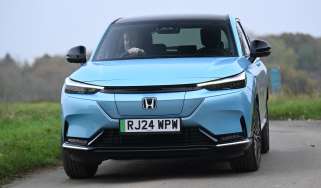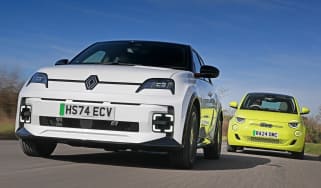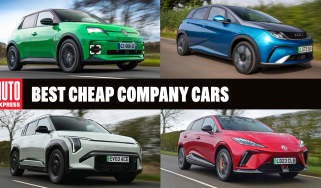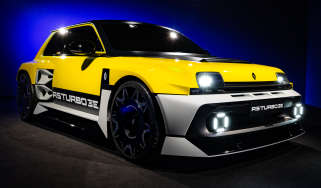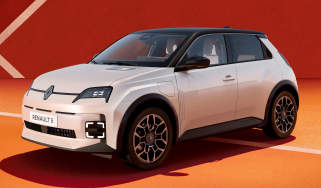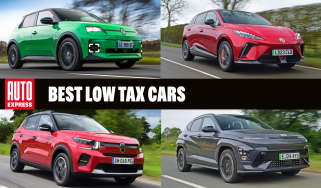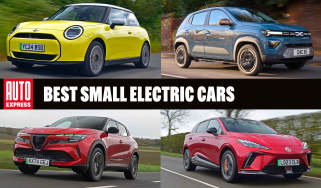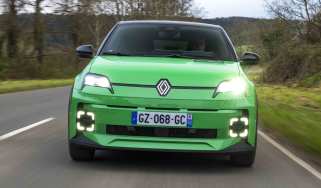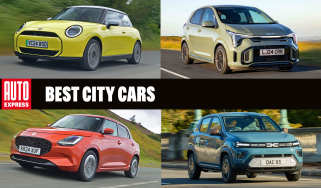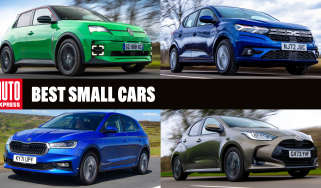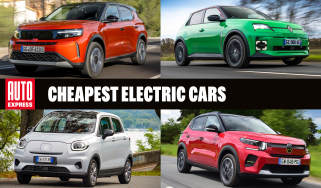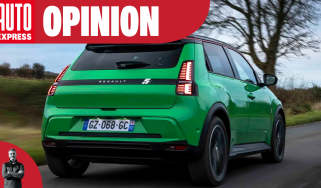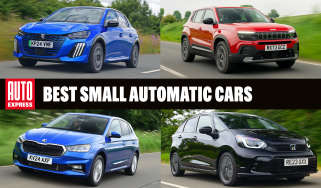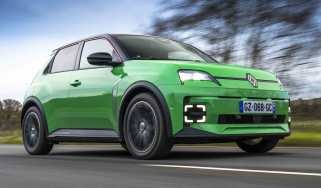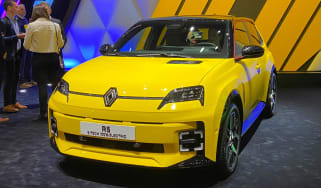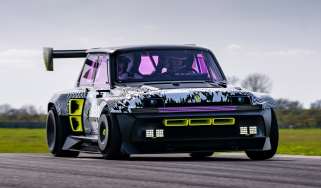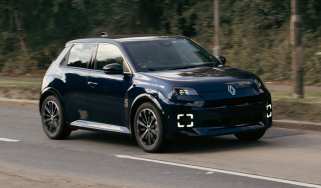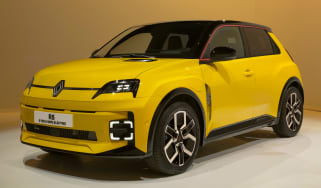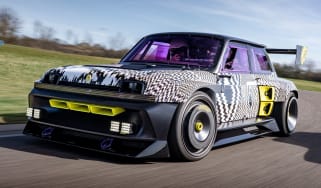Renault 5 review
The retro-inspired Renault 5 electric supermini is well priced, nice to drive, and has great tech

Our opinion on the Renault 5 E-Tech
The automotive world has seen how well retro-inspired designs have worked for the likes of Fiat and MINI, so Renault has decided “why not?”. The brand hopes that the latest Renault 5 has enough style to remind those of us old enough to remember the distinctive original, yet it balances that with a sharp, contemporary body that will attract younger buyers who simply want a striking small car.
But while the Renault 5 plays heavily on nostalgia, there’s so much joy in this little package that it’s impossible not to be impressed. It feels like a more compelling posh supermini than a MINI Cooper or Peugeot E-208, and it has just enough space inside, a decent electric range across both powertrain and battery options, plus a competitive price. While we would like a slightly more forgiving ride and a less abrupt stability control system, the R5 ticks all the boxes that make it one of the best options in the class.
| Key specs | |
| Fuel type | Electric |
| Body style | Five-seat hatchback |
| Powertrain | 40kWh battery, 1x e-motor, front-wheel drive 52kWh battery, 1x e-motor, front-wheel drive |
| Safety | 4-star (Euro NCAP, 2024) |
| Warranty | 4yrs/100,000 miles |
About the Renault 5 E-Tech
The Renault 5 is designed to offer the sort of desirability that will tempt buyers away from low-priced Chinese EVs, but it seems as if Renault isn’t looking too shabby on that latter front either. The base Evolution model is offered only with the smaller 40kWh battery, and starts from around £23,000. For that, you’re getting 18-inch wheels, LED headlights and rear parking sensors as standard. There’s a 10.1-inch touchscreen with Apple CarPlay and Android Auto, but without Google built-in.
Used - available now

2023 Audi
Q4 Sportback e-tron
54,526 milesAutomaticElectric
Cash £23,363
2022 Kia
Niro
18,315 milesAutomaticPetrol1.6L
Cash £17,900
2023 Nissan
Juke
40,858 milesManualPetrol1.0L
Cash £12,287
2022 Volkswagen
T-Roc
36,779 milesAutomaticPetrol1.5L
Cash £18,600Techno trim weighs in at £2,000 extra with the same 40kWh battery and electric motor set-up, while another £2,000 on top of that secures the 148bhp motor with the large 52kWh pack. In terms of kit, it adds the Google infotainment tech, which includes battery preconditioning and route planning, the '5' bonnet charge indicator and a reversing camera.
The top-spec Iconic Five costs around £27,000 with the 118bhp motor, and again £2,000 extra for the 148bhp motor. It has a different design of 18-inch alloy wheel from the other trims, and adds heating for the steering wheel and front seats, plus adaptive cruise control, blind-spot warning and a hands-free parking system.
All versions of the Renault 5 E-Tech are front-wheel drive, while the only body option is a five-door hatchback. This is shared with the Alpine A290, which is the hot hatch variant.
Performance & driving experience
| Pros | Cons |
|
|
Renault has engineered a feeling of solidity into the way that the 5 behaves on the road. In terms of refinement and stability, it really doesn’t feel like a small car at all. It’s all very grown up and reassuring.
There are three drive modes, which make a fairly substantial difference to everyday driving, even if the overall performance remains relatively conservative. We’d skip the Eco setting. It doesn’t really do much to increase the overall range beyond making the throttle response very sluggish. The response in Comfort is very natural and progressive, while Sport mode sharpens things up further.
Electric motors, 0-60mph acceleration and top speed
Whichever version of the Renault 5 you choose, it features a single electric motor driving the front wheels. Renault offers buyers a choice of two e-motor outputs, each with its own battery size.
The range starts with a 118bhp version with 225Nm of torque; this motor is paired to a 40kWh battery, which returns a claimed 190-mile range. We’re yet to drive the entry-level model, but its performance looks sprightly enough on paper; 0-62mph takes nine seconds, which is identical to the Fiat 500, and is still several seconds faster than the Citroen e-C3 and BYD Dolphin Active.
But we’ve spent plenty of time behind the wheel of the 148bhp model. As well as the extra 30bhp offered over the entry-level car, it also gains 20Nm of torque to lift its total to 245Nm. Thanks to a 52kWh battery, the WLTP range climbs to 251 miles, too.
On the road, it feels every bit as quick as the 7.9-second 0-62mph time suggests. This is a little behind the entry-level MINI Cooper E, which has figures of 176bhp and 280Nm, but the Renault is around 175kg lighter. This difference in weight is even more impressive when you consider the MINI’s smaller 38kWh battery. Despite the Renault having nearly 30bhp less than the base MINI Cooper E, its 0-62mph time of eight seconds is only around 0.7 seconds slower.
The R5’s throttle mapping is quite smooth – even in its most responsive Sport mode – so it’s easy to control the power at low speeds without the wheel-spinning moments that some rivals often provide. The motor is very quiet and the feedback through the brake pedal is reassuring and smooth as it transitions between motor regeneration and mechanical braking.
The R5’s top speed is capped at 93mph, for the sake of both electric range and the e-motor’s gearing.
Town driving, visibility and parking
While the Renault 5 has a solidity that is easy to feel even at low speeds, Renault has kept many of the typical small-car traits that make models such as this so much fun to drive around town. The steering is light and darty – but with a slightly strong self-centring effect around the straight-ahead – and the turning circle is impressively tight, so low-speed manoeuvres feel like they come naturally to the 5.
The ride is a little on the firm side. The damping is well controlled, so it rarely feels harsh, but there’s an ever-present bounce that’s familiar in any small EV with a short wheelbase – dealing with the mass proves to be quite a challenge for chassis engineers in these circumstances. That aside, the powertrain is smooth, the brake feel is reassuring, and a B mode increases the level of brake regeneration significantly, but not enough to offer complete one-pedal driving.
B-road driving and handling
Up the pace, and the 5 is quite entertaining to drive. The low centre of gravity provided by the battery pack in the floor limits body roll, but not so much that you can’t feel what the car is doing beneath you.
Get bold through a corner, and you can even play with the 5’s balance on and off the throttle. It’s not quite as fun to drive as previous supermini handling stars such as the Ford Fiesta – or numerous French small cars before that – but it’s among the more entertaining small models you can buy today.
Motorway driving and long-distance comfort
That solid feeling pays dividends on a motorway. While this isn’t going to be most buyers’ first choice for a long-distance slog, the 5 is more than up to the task. It feels stable, refined and reassuring, and despite the straight-line performance tailing off beyond 60mph, there’s still more than enough in reserve to make great progress. Road and wind noise are impressively well contained for a car of this size, too.
Expert view, on the driving experience
“There’s a little bit of work to do with the R5’s brakes: push the brake pedal at low speeds, and the regenerative braking will snap on without much subtlety, forcing you to concentrate harder than is ideal for town driving. With some acclimatisation, things improve, but the set-up in other vehicles is more intuitive.” - Jordan Katsianis, senior staff writer, after his time with a left-hand drive R5 on UK roads.
| Model | Power | 0-62mph | Top speed |
| Renault 5 40kWh Urban Range | 118bhp | 9.0 seconds | 93mph |
| Renault 5 52kWh Comfort Range | 148bhp | 8.0 seconds | 93mph |
Range, charging & running costs
| Pros | Cons |
|
|
We’ve yet to sample the 40kWh Renault 5, but we found that it’s just about possible to match the claimed efficiency figures in the 52kWh model.
Electric range, battery life and charge time
Being a small car with a relatively modest amount of weight to move around allows the 5 to make better use of its energy than most other EVs. In a mix of driving environments with temperatures around 17 degrees Celsius, we achieved 4.1 miles per kilowatt-hour, but that included motorway driving that uses more energy. At lower speeds, things improved to 5.0mi/kWh, which means at its best, the 5 should be able to cover an impressive 260 miles between charges – slightly more than its 251-mile WLTP range.
While a standard-fit heat pump means there’s little penalty for using the heating, much as with any other EV, the 5’s range does take a hit in cold weather. With temperatures around freezing, we averaged 3.2mi/kWh in mixed driving (including motorways), which knocks the range down to 166 miles.
Renault claims that the big-battery 5 can charge at up to 100kW, but the best we saw was closer to 80kW, when the battery was at around 30 per cent charge. Some electric vehicles, including Teslas and VW Group products, can precondition the battery in advance of reaching a charge point so you get the advertised speeds straight away. It’s a feature that we’d like to see on the 5 in future, because it was clear on arrival at a rapid charge station that speeds were initially sluggish, although things did improve significantly once the battery warmed. The entry-level car with the smaller 40kW battery charges at a maximum of 80kW.
| Model | Battery size | Range | Insurance group |
| Renault 5 40kWh Urban Range | 40kWh (useable) | 193 miles | 18 |
| Renault 5 52kWh Comfort Range | 52kWh (useable) | 249 miles | 22 |
Insurance groups
Depending on the trim and powertrain you choose, the Renault 5 ranges from insurance groups 18 to 22. That’s fairly low relative to its closest rivals; the MINI Cooper E, for example, ranges from groups 20 to 26.
Tax
Being an EV that falls well below the £40,000 luxury car tax surplus, this Renault is cheap for private buyers to tax. The first year’s VED stands at £10 (up from £0 pre-April 2025), and will cost £195 a year in road tax.
Depreciation
Renault has got its pricing reasonably competitive from the outset, and that’s reflected in the predicted residual values across the range. Every trim level is expected to hold onto almost half of its original cost after three years or 36,000 miles. The exception is the base model, which keeps one per cent more of its lower asking price.
That means while residuals aren’t as strong as for the MINI Cooper Electric (depending on trim, it’ll maintain between 50 and 57 per cent of its value over the same period), the Renault resists depreciation much more doggedly than small hatchbacks, such as the Peugeot E-208, Vauxhall Corsa Electric and Fiat 500.
Interior, design & technology
| Pros | Cons |
|
|
Renault has done a lot of work to reinterpret the iconic R5. The original sold in the millions over the course of more than a decade, born from the brilliant and esoteric designer Michel Boue. It was a car that embodied his brilliance, with a simplicity of form and efficiency of space that underpinned its success over the decades.
To reimagine it for the modern age could have been a minefield; appropriating something so iconic into something modern can easily take a wrong turn. This is something that Renault’s design team under Laurens van den Acker has largely avoided, creating the next great retro-rehash after the MINI and Fiat 500, and arguably the first successful reinterpretation of an eighties icon.
The design has plenty of references to the old car, but thanks to clever detailing and the use of contrasting colours and shapes, it hides a very different set of proportions. The R5 is relatively wide, something that Renault has emphasised with the flared arches that take inspiration from the R5 Turbo. Other elements, such as the square headlights, upright rear lamps and sloping C-pillar, all take the basic shape of the original concept and modernise it through contemporary graphics and detailing.
There are a few concessions to modern trends – the bi-colour body colour options and framed wheelarches, for example – but these don’t take away from the originality that has been applied where appropriate. Available in a blindingly bright metallic green or yellow, plus a more subdued range of white, black and navy blue, these can be highlighted with coloured trim strips and optional graphics where applicable.
All models are fitted with 18-inch wheels, which just about fill the arches, leaving space for larger and more aggressive options down the line. Techno models and above feature a rather large oblong feature, which on the original housed an air vent, but here acts as a battery charge indicator.
Interior and dashboard design
Renault has leant into its heritage with the 5’s cabin. The fabric-covered dashboard and the distinctive shape of the seats are inspired by the first-generation 5 from the seventies, while the pronounced shelf ahead of the passenger and prominent air vents pay homage to the Mk2 ‘Supercinq’.
That this is all integrated into the overall design alongside modern creature comforts such as digital displays and physical climate control functions, is a great achievement.
While the MINI and Fiat 500 play on their retro designs and feel similarly special, the Renault has the most logical ergonomics of the three. The one small exception is the gear selector. The spindly column stalk is mounted just above the control for the wipers, and we found that it was quite easy to inadvertently knock the wrong one when quickly switching between drive and reverse, for example, when parking or doing a three-point turn. Given that there is a third stalk on that side further down – Renault’s otherwise very intuitive volume and media controls – it feels a little cluttered in that area.
Materials and build quality
Overall build quality is solid enough for a small car. It’s not quite as posh-feeling as the latest MINI’s cabin, but the few hard plastics inside the 5 tend to be low down, with fabric pieces covering the bits closer to hand.
Iconic Five models at the top of the range feature a modern-feeling yellow and grey fabric across the seats, which look like they should wear well, with a contrasting black vinyl on the dash with yellow stitching. This definitely gives a sense of high quality to the cabin, and is a nice reference to the original, but the slightly shiny leather-like material did make it look a little like a rolled and trussed loin of pork ready for the oven. Lesser models come with denim-like fabric across the dash, and the seats look a little more modern and less like the inside of a butcher’s shop in greyscale.
On the whole, the important elements, such as the dash front, door cards, seat controls and steering wheel feel sturdy and well made, but there are some flimsy plastics used on parts such as the boot grab handle and rear doors.
Infotainment, sat-nav and stereo
The digital instrument panel ahead of the driver is sharp and easy to read, with a fairly uncluttered layout that allows for a bare minimum of information to be displayed to avoid distraction. All elements of information are highly stylised and vary depending on your chosen drive mode. Fundamentally, your speed and the main information hub are static and sit either at the centre of the screen or to the right, with a central section that can be brought up to show active driver aids, efficiency info or fully embedded Google Maps navigation.
The system works brilliantly, and unless you’re entering a particularly complicated urban environment, offers more than enough space and information to be used as the main navigation display. A third, more compact window can be brought up on the extreme right-hand side to show yet more info, but in all cases, the display is variable enough to be perfectly customised to your preferences without offering too many needless options.
Physical climate controls make adjusting basic settings feel very intuitive from the second you get behind the wheel. That sounds like something that should be taken for granted, but that isn’t always the case in many touchscreen-reliant new cars.
Renault’s latest infotainment set-up leans heavily on Google-based tech. Using the know-how and operating system from a tech giant means that it’s far better than Renault’s previous touchscreen attempts when going it alone – and it’s better than other manufacturers’, too.
Built-in Google Maps is brilliant for route planning and locating charging points, and the loading and response times are better than most systems at any price. The other menus are logically laid out and easy to use, too, with big on-screen keys and simple functions.
Bluetooth is quick and simple to set up, and we had no problems with connection or sound quality. Speaking of which, the Arkamys sound system is very good for the class, easily rivalling the Harman Kardon system found in an equivalent MINI.
Expert view, on design
“If we have one gripe with the infotainment system, it’s with the Renault personal assistant. Called ‘Reno’ (pronounced ree-no) it reminded us of the Microsoft paperclip in both appearance and general irritation.” - Jordan Katsianis, senior staff writer, who spent time with a left-hand drive R5 on UK roads.
Boot space & practicality
| Pros | Cons |
|
|
There’s one body available for Renault’s supermini-sized EV, and compared with a traditional supermini, or even a crossover model such as the Citroen e-C3 or Fiat Grande Panda, the R5 will seem tight inside. This is largely due to the fact that Renault has prioritised boot space over rear legroom.
The dark interior roof lining (cool though the waffle pattern might be) and narrow windows accentuate this, but it’s by no means claustrophobic. There are five seats on all models, and while legroom is at a premium, the lack of a central tunnel in the rear footwell, and a relatively wide body mean it’s not too short on foot space.
Dimensions and size
At 3,922mm long, the R5 is a full 128mm shorter than the familiar Renault Clio and 165mm shorter than the Renault Zoe that it replaced. However, it’s still 64mm longer than another compact retro small car whose success the R5 will hope to emulate, the MINI Cooper.
| Dimensions | |
| Length | 3,922mm |
| Width | 1,774mm |
| Height | 1,498mm |
| Number of seats | Five |
| Boot space | 326-1,106 litres |
Driving position, seats & space in the front
The 5 feels quite substantial for such a small car in the front. The dash is fairly high, so those wanting a great view out will need to jack the seat up a little.
Fortunately, the front seat and steering wheel offer lots of adjustment, so it’s not hard to find a comfortable seating position. But the large outer rear headrests obstruct part of the driver’s view out of the back window.
Seats & space in the back
The rear seats are comfortable, but predictably for such a small car, they’re not incredibly spacious. Knee room is similar to a Vauxhall Corsa, so there’s less than in the roomiest hatchbacks on the market, such as the Skoda Fabia. Headroom is about average for a supermini, and almost identical to what we have measured in the back of a Renault Clio.
All versions of the Renault 5 come with Isofix child seat mounting points on the outer seating positions of the rear bench. Just like the MINI Cooper, the R5 also has a child seat mounting point on the front passenger seat, giving families a little more flexibility when it comes to fitting everyone inside.
Boot space
At 326 litres, there’s plenty of boot space by small car standards, but a high load lip makes lifting larger items on board tricky. There’s not much in the way of floating floors or variable boot heights, and without any under-bonnet storage, this space will also need to house the charge cables.
Dropping the seats expands the volume to 1,106 litres, but the folded seat backs create a step up from the main boot floor.
Expert view, on practicality
“While no one will feel particularly cramped inside the Renault 5, its narrow windscreen and relatively high dash mean it doesn’t have the sense of airiness that some rivals offer." - Jordan Katsianis, senior staff writer, who spent time with a left-hand drive R5 on UK roads.
Reliability & safety
| Pros | Cons |
|
|
Along with EV rivals such as the Fiat 500, Peugeot E-208 and Vauxhall Corsa Electric, the 5 only got a four-star out of five safety rating from Euro NCAP. It was penalised because Renault couldn’t demonstrate that the dash could provide the same level of protection to occupants of differing sizes. There is also no central airbag to prevent front-seat occupants from colliding in a side impact.
There are plenty of standard assistance features on board. Automatic emergency braking works both going forward and in reverse, while lane-departure warning and emergency lane-keeping assistance are included. The top-spec Iconic 5 adds blind-spot warning to let you know of vehicles to the side of you when you go to change lanes, and a safe-exit assistance feature to help prevent you from opening the door into the path of approaching vehicles. In the event of a collision, the doors will automatically unlock, and the hazard lights will activate.
Every new car is mandated to switch on a speed limit warning beep and a lane-keep assist function every time the car is started. Renault makes these systems easier to disable in its vehicles than they are in any other car. The ‘My Perso’ mode lets the driver set the safety-assist tech exactly to their liking.
Program this once on the infotainment screen, and every time you start the car, it just takes two prods of a button (activation, then confirmation) to the right of the steering wheel to get everything just how you like it.
Renault doesn’t have a great reputation in our Driver Power owner satisfaction survey, with the firm coming 28th out of 30 brands in 2024. Its best individual category score was 12th for running costs, with cheap servicing in ninth, followed by 16th for tax and insurance, and 18th for fuel economy.
| Key standard safety features | Euro NCAP safety ratings |
|
|
Buying and owning
- Best buy: Renault 5 E-Tech 52kWh Iconic Five
Thanks to the good-value pricing that Renault seems to perfectly nail with all of its models, we see no reason why you wouldn’t want to choose the top-spec Iconic Five model for the most distinctive looks and longest kit list. And unless you’re certain that you’ll only be doing short journeys, the extra outlay for the 52kWh battery over the 40kWh version seems like money well spent to quell any range anxiety.
Renault offers a four-year warranty on its latest EVs - 12 months longer than the warranty for its combustion engine-equipped cars - and this runs up to 100,000 miles.
The French marque offers a selection of service plans for the 5, too, with a three-year agreement priced at around £12 a month for 36 months.
Alternatives
The fight in the small, desirable supermini segment is between three retro-inspired models. MINI is the brand that Renault will want to emulate most, and there’s a new generation of models in both electric and petrol forms that represent the R5’s biggest rival.
Both the bigger-battery R5 and Cooper SE feature similarly sized 50kWh-ish packs, front-mounted motors and around 250 miles of range. The MINI has three doors compared with the Renault’s five, and while an electric five-door MINI isn’t yet on the cards, there is an alternative in the MINI Aceman to consider.
The key difference is that, model-for-model, the R5 will undercut the MINI by around £5,000 – a lot of money at this end of the marketplace. Not only that, but Renault also doesn’t skimp on standard equipment, and while the R5 is relatively compact inside, it still beats the MINI for both rear-seat and boot space. The new MINI is the more engaging drive, but it also rides more firmly, which ultimately limits its appeal as a daily driver.
Sitting below both R5 and MINI is the Fiat 500, a model that’s more aligned with the smaller 40kWh R5. It still can’t get close to the R5’s circa-190 mile range, sitting at around 140 miles, and is more than a tad under-nourished when it comes to standard equipment. Spec it up, and it’ll cost more than an equivalent R5.
The Renault’s vital statistics also compare well to those of more mainstream electric superminis such as the Vauxhall Corsa Electric and Peugeot E-208. Spec-for-spec, the R5 definitely shows the Stellantis pair a clean set of heels.
So the R5 is great value, and as such, it also stands as one of the first in a new era of more affordable EVs that will rapidly come on stream. This includes cars such as the Citroen e-C3 and Fiat Grande Panda, both of which lower the price of entry below the R5’s £23k. They also have equivalent range figures, and offer more space. So while the R5 looks on point right now, things will change.
Renault 5 pictures
Frequently Asked Questions
We love it. The combination of retro-inspired looks, grown-up driving dynamics, a punchy electric powertrain and decent range mean it's a very convincing small EV.






